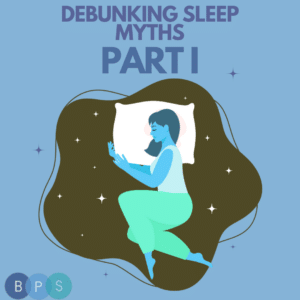Picture this: It’s an important night! You’ve got a big presentation tomorrow! You’re about to meet your in-laws for the first time! You’re traveling first thing in the morning! Whatever the scenario, all you want is to get a good night’s sleep, but you’re wide-awake staring at the ceiling, counting sheep. Sound familiar?
It’s likely we’ve all gone through this demoralizing experience of lying in bed and listening to the clock tick, tick, tick at some point in our lives.
Today we’re going to go over some strategies to improve our sleep, but before we dive into those, let’s address a few sleep myths first.
Myth 1: If you’re having trouble falling asleep, stay in bed until you can
While it can feel counterintuitive to get out of bed when you are trying to fall asleep, experts actually recommend it. This is because it’s important to associate your bed with sleep and lying in your bed all restless can do the exact opposite. Instead of lying in bed, twiddling your thumbs, and worrying about when the sand man will come to collect you, after about 20 minutes of trying to fall asleep, get out of bed and do something relaxing like read a book (Robbins et al., 2019).
Myth 2: Your body gets used to lack of sleep
Maybe this happens to you on a regular basis, and you tell yourself it’s fine because your body gets used to the lack of sleep. As much as we may want this to be true, this is, in fact, also a myth. Persistent lack of sleep takes a toll on you and can hinder decision-making, memory, focus, and creativity. If you’re reading this thinking, “eh, it really doesn’t seem to be catching up with me,” you may be accumulating more serious health problems that you aren’t aware of (Robbins et al., 2019).
Myth 3: Napping makes up for lack of nighttime sleep
Now you might be thinking, “okay fine, my sleep isn’t great at night, but I can always just take a nap the next day to get that energy boost I need!” Sadly, this is another myth. This is because during a nap, you typically won’t go through all the stages of sleep to make up for quality sleep at night. Instead, napping can throw off your sleep schedule even more, and make it harder to fall asleep later (Robbins et al., 2019).
Myth 4: Alcohol before bed improves sleep
Okay, so naps are a no go, but what about the glass or two of wine? Another myth! While alcohol might make us feel more relaxed and drowsy, it throws off our sleep cycles which worsens the quality of our sleep and makes it harder to get into REM. It can also worsen snoring and sleep apnea. Experts also warn against caffeine in the afternoon and evening (Robbins et al., 2019).
Myth 5: How long you sleep is all that matters
“But as long as I’m getting enough hours of sleep, I’ll be well-rested right?” Myth. It’s not actually all about the duration of sleep. Sleep quality is also critical. It’s important that our sleep is as continuous and uninterrupted as possible in order to hit all of the stages in the sleep cycle and get optimal rest and recovery (Robbins et al., 2019).
If you’re now feeling discouraged from all of these sleep myths, there is some positive news…Check out our upcoming post to learn tips and tricks for optimizing sleep!
Source:
Robbins, R., Grandner, M. A., Buxton, O. M., Hale, L., Buysse, D. J., Knutson, K. L.,
Patel, S. R., Troxel, W. M., Youngstedt, S. D., Czeisler, C. A., & Jean-Louis, G. (2019). Sleep myths: an expert-led study to identify false beliefs about sleep that impinge upon population sleep health practices. Sleep health, 5(4), 409–417. https://doi.org/10.1016/j.sleh.2019.02.002
